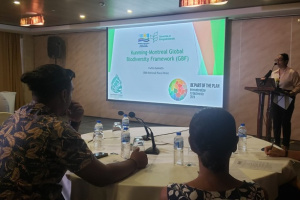2 of Seychelles' islands found to be crucial habitat for endangered coral reef fish

Sleeping humphead wrasse on the coral reef at D'Arros Island. (Ryan Daly/Save Our Seas Foundation)
(Seychelles News Agency) - Two islands of Seychelles recently designated as marine protected areas will be crucial habitats to an endangered and ecologically important coral reef fish, a new study found.
Results from a study by scientists from the Save Our Seas Foundation indicate that the areas around D'Arros and St Joseph announced as marine protected areas in March will directly benefit the humphead wrasse species.
Ryan Daly, who led the study published in the academic journal Endangered Species Research on May 14, said, "Humphead wrasse populations globally are in decline, yet are important for tourism, fisheries and the health of coral reef ecosystems."
The humphead wrasse is an enormous coral reef fish -- growing to over six feet long -- with a prominent bulge on its forehead, hence the name. The species which can live to over 30 years old is listed as endangered by the International Union for Conservation of Nature (IUCN).
The study site was home to a group of large and currently unexploited humphead wrasse and the 20 that were tagged exhibited persistent site fidelity over a 500-day period, rarely travelling more than a few kilometres from the area.
 |
| The reefs around D'Arros and St Joseph are a refuge for many threatened species, including the endangered humphead wrasse. (Dan Beecham) Photo License: All Rights Reserved |
Daly said that "prior to the publication of our research, knowledge of the species' movement ecology was limited to only two previous studies and very little was known about the populations in the Western Indian Ocean."
The predictable, long-term site fidelity highlights the species' vulnerability to over-exploitation – a concern the new marine protection policies in Seychelles can eliminate.
The chief executive of the Save Our Seas Foundation, James lea, said that "as we continue to lose fish biodiversity across the world's oceans, it is more important than ever to understand the abundance and movement patterns of species classified by the IUCN as endangered, like the humphead wrasse."
He added that thanks to the Foundation's expansive Amirantes acoustic array "our project leaders were able to shine a light on the lives of these charismatic creatures and better determine how important this area of Seychelles' waters is to their survival."
The study proves that the new conservation zone encompasses a core home range area of all the tagged humphead wrasse and will effectively conserve this stronghold for the endangered species to ensure its persistence in Seychellois waters.
St Joseph is part of the D'Arros group of islands in the outer islands of the Seychelles archipelago of 115 islands in the Indian Ocean. The group became an officially protected nature reserve under the Nature Parks and Conservancy Act in July 2014.
Now that new marine protections are in force, Daly said that these large fishes are playing a crucial role in reef communities, acting as an umbrella species that indirectly benefit others through the human conservation efforts designed to protect it.
Founded in Geneva, Switzerland in 2003, the Save Our Seas Foundation is a philanthropic organization that aims to protect and care for the world's oceans.





